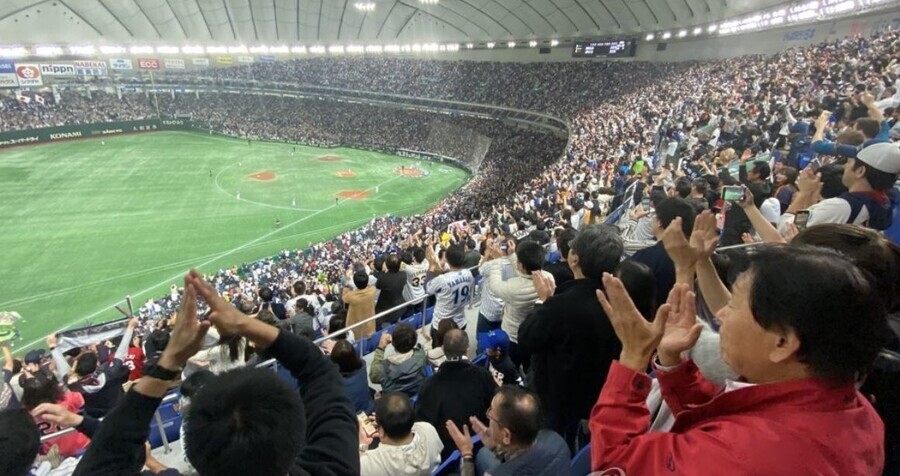hankyoreh
Links to other country sites 다른 나라 사이트 링크
Japan to allow baseball stadiums to operate at 80% capacity to test COVID countermeasures

Leading up to the Summer Olympics in Tokyo, the Japanese government is allowing baseball stadiums to fill up to 80% of capacity as part of a controversial test of the efficacy of the government’s COVID-19 countermeasures. Given growing concerns that bringing tens of thousands of fans together will lead to more infections, critics accuse Tokyo of carrying out what amounts to a medical experiment on human beings.
According to a Nov. 2 report in Japanese newspaper the Mainichi Shimbun, an empirical test will be conducted at Tokyo Dome over the weekend, on Nov. 7-8, following a similar test at Yokohama Stadium. The risk of infection clusters is greater at the Tokyo Dome, an indoor stadium with worse ventilation.
The government will be using supercomputers to assess the impact of droplets, determine the percentage of mask usage, monitor infections near the stadium around the game, and check on levels of crowding in the bathrooms. Some 30,000 fans are reportedly expected to attend the weekend games pitting the Yomiuri Giants against the Yakult Swallows.
An earlier COVID-19 experiment was carried out at Yokohama Stadium during games between the DeNA BayStars and the Hanshin Tigers on three days between Oct. 30 and Nov. 1. Fans were allowed to fill 51% of stadium seats on the first day of the experiment, 76% of seats on the second day, and 86% (27,850 people) on the third and final day, on Nov. 1.
Currently, sporting facilities are only allowed to operate at half capacity, but more people are being admitted for these experiments. The Japanese government believes that the size of crowds that can watch domestic sporting events is an important data point needed for Olympic preparations.
This series of experiments had provoked a major debate about safety. A university student and part-time stadium worker expressed concerns in an interview with the Mainichi Shimbun. “When fans are caught up in cheering for their team, they’re likely to forget about social distancing,” the worker said.
“The timing isn’t good since we’re on the cusp of a third wave,” said Atsuro Hamada, professor at Tokyo Medical University, referring to the fact that Japan continues to see a considerable number of infections.
“I know there isn’t a lot of time left before the Olympics, but a surge of infections could put the Olympics themselves in jeopardy,” Hamada told the Mainichi Shimbun.
Japan reported an average of 695 daily COVID-19 infections during the week ending on Nov. 1. Considering that the previous week saw an average of 571 cases a day, the spread of the disease appears to be accelerating.
“I’ve consistently been opposed to running this experiment, but this is the worst time to do it. I have nothing left to say,” tweeted Koichi Kawakami, a professor at Japan’s National Institute of Genetics.
By Kim So-youn, staff reporter
Please direct comments or questions to [english@hani.co.kr]

Editorial・opinion
![[Guest essay] Seoul is missing the ‘golden hour’ for diplomacy with its northern neighbors [Guest essay] Seoul is missing the ‘golden hour’ for diplomacy with its northern neighbors](https://flexible.img.hani.co.kr/flexible/normal/500/300/imgdb/original/2024/0523/3217164523751201.jpg) [Guest essay] Seoul is missing the ‘golden hour’ for diplomacy with its northern neighbors
[Guest essay] Seoul is missing the ‘golden hour’ for diplomacy with its northern neighbors![[Column] Tariffs on China: Trump was dumb, Biden dumber [Column] Tariffs on China: Trump was dumb, Biden dumber](https://flexible.img.hani.co.kr/flexible/normal/500/300/imgdb/original/2024/0520/191716191153918.jpg) [Column] Tariffs on China: Trump was dumb, Biden dumber
[Column] Tariffs on China: Trump was dumb, Biden dumber- [Column] What if Seoul took reunification by force off the table?
- [Editorial] Intensifying US-China rivalry means Seoul must address uncertainty with Beijing sooner than later
- [Column] When ‘fairness’ means hate and violence
- [Editorial] Yoon must stop abusing authority to shield himself from investigation
- [Column] US troop withdrawal from Korea could be the Acheson Line all over
- [Column] How to win back readers who’ve turned to YouTube for news
- [Column] Welcome to the president’s pity party
- [Editorial] Korea must respond firmly to Japan’s attempt to usurp Line
Most viewed articles
- 1BBC documentary’s new revelations about Burning Sun scandal reignite rage, grief in Korea
- 2[Column] Korea’s conservatives are forgetting how to govern
- 3[Editorial] Yoon is defying the will of an angry public with vetoes
- 4Yoon rejects special counsel probe into Marine’s death in 10th veto of term
- 5Global stock markets are rallying to new highs — so why isn’t Korea’s?
- 6[Column] US troop withdrawal from Korea could be the Acheson Line all over
- 7To weigh costs and benefits, Korea must stop treating US troop presence as a sacred cow
- 8New doc undoes stereotypes of N. Korea with candid portraits of women’s football legends
- 9Desperate to boost competitiveness, Samsung calls up old guard to run chip business
- 10Korea’s dilemma: US-led chip alliance or Chinese market?